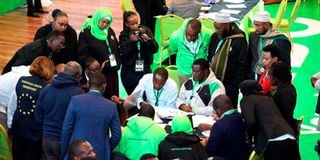Premium
Lessons and traumas from Kenya’s chequered quest for poll reforms

Observers and party agents compare notes at the Independent Electoral and Boundaries Commission’s desk, Bomas of Kenya on August 11, 2022.
What you need to know:
- Chebukati has publicly demonstrated his commitment to complying with the Constitution and the Supreme Court’s requirements.
- Under pressure from the leading presidential candidates’ campaigns to announce their man, Chebukati flung open the IEBC results portal.
- This act of unprecedented transparency heralds Chebukati’s confidence that the 2022 election incorporated all the lessons we have had to learn.
Kenya’s four-decade journey to a rigging-proof election has been an eventful saga.
The majority of voters today probably have no idea what mlolongo was, and why their elders are manically obsessed with freedom, democracy, transparency, accountability and, especially, free and fair elections.
Once upon a time, voting was a dangerously simplified affair. Competing candidates prepared posters bearing their images, symbols, names and slogans.
Strong loyalists were then assigned the challenging task of standing in line holding these posters up, and raia expressed their electoral preference by queuing behind their favourite candidate.
For transparency, this was insuperable, but it produced lots of discomfort and embarrassment as sometimes, candidates endured a lonely ordeal when they were requested to hoist their own posters while their agents dashed to queue behind their rivals.
No family member. No friend.
More often than not, unwholesome suasions, overt compulsion and brazen threats by powerful actors influenced queuing behaviour. Bosses, landlords, creditors and sundry wielders of leverage easily determined where one stood, literally.
Kanu officials, the provincial administration and state officers were more robust in their indications. Yet Kenya’s hatupangwingwi ethos manifested even in those improvident circumstances.
Importunate functionaries
Electors would defy the malevolent injunctions of importunate functionaries and nevertheless chose the candidate they liked.
In such cases, a syndicate of provincial administrators and Kanu officers would proceed to switch the poster bearers so that the queues could align with the state’s preference.
Administrative commissioners were returning officers in these fiascos.
By the time Kanu was done with Kenya, people had lost trust in the state, elections, the provincial administration and ruling parties. The notions of ‘the system’ and ‘deep state’ simultaneously express generational trauma and a keen propensity to reproduce diabolical schemes aimed at subverting public interest.
The gradual liberation of elections from state capture began in 1997 when the Inter-Parties Parliamentary Group secured a deal to enable parties to nominate commissioners to the election management agency.
In that year’s parliamentary elections, Kanu’s blue-eyed boy, holder of one of Africa’s most famous surnames, Uhuru Kenyatta, was disastrously walloped by a candidate who remains as unknown today as he then was.
In the following election, the Electoral Commission of Kenya (ECK) was robust enough to upset the ruling party and steward the country’s first transition of power and initiate Kenya’s democratic consolidation.
In the process, Kenya’s independence party, Kanu, suffered a catastrophic blow and has been haemorrhaging steadily since.
It so happens that this calamity befell our mouldy liberation movement whilst Kenyatta was its presidential candidate.
Although he was elected as MP, at last, his traumatic initiation into politics apparently inscribed upon his psyche a reflexive aversion to elections and, by extension, democracy.
From the outset, he was a reluctant politician, and his first two outings graphically affirmed the worst of his misgivings.
If he must play the game, Kenyatta resolved to secure greater certainty, retain control and render himself impregnable. By co-opting Odinga in 2018, Kenyatta was really trying to exorcise the pernicious spectre of Moses Muihia. I digress.
After handing us the first democratic turnover of power in 2002, ECK faltered, slipped and fell, in 2007.
We lost everything, our innocence included. To place us on a recovery path, the Commission of Inquiry into Post-election Violence, led by Johann Kriegler, performed a parsimonious audit of the 2007 election and produced a magisterial report whose prescriptions comprised a comprehensive reform agenda.
The Kriegler Report plugged into the Agenda 4 reforms of the National Accord and led to the replacement of ECK by the Interim Independent Electoral Commission, a time-bound enterprise whose mandate expired a year later, when the constitution was promulgated, which inaugurated the Independent Electoral and Boundaries Commission.
Accurate and accountable
The IEBC is mandated to conduct, by secret ballot, elections that are free from violence, intimidation, improper influence or corruption, and to ensure that they are transparent and conducted in a manner that is impartial, neutral, efficient, accurate and accountable.
In 2013, Raila Odinga petitioned the Supreme Court to audit the election for conformity with the Constitution.
The court unanimously certified the poll. In 2017, Odinga returned with a petition. This time, the court found the IEBC had fallen short of the constitutional standard and served Chebukati & Co a scathing rebuke.
Chebukati has publicly demonstrated his commitment to complying with the Constitution and the Supreme Court’s requirements.
Under pressure by the leading presidential candidates’ campaigns to announce their man, Chebukati flung open the IEBC results portal and invited tout le monde to tally the results for their own comfort.
This act of unprecedented transparency heralds Chebukati’s confidence that the 2022 election incorporated all the lessons we have had to learn, in order to save us the traumas that continue to define us.
Mr Ng’eno is an Advocate of the High Court of Kenya and a former State House speech writer. @EricNgeno




